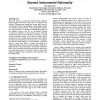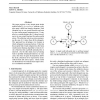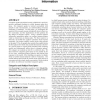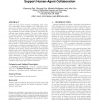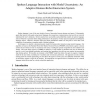550 search results - page 48 / 110 » A Design Process for Adaptive Behavior of Situated Agents |
GECCO
2008
Springer
13 years 9 months ago
2008
Springer
This study proposes an agent-based model where adaptively learning agents with local vision who are situated in the Prisoner’s Dilemma game change their strategy and location as...
ICML
2003
IEEE
14 years 9 months ago
2003
IEEE
The paper explores a very simple agent design method called Q-decomposition, wherein a complex agent is built from simpler subagents. Each subagent has its own reward function and...
ATAL
2008
Springer
13 years 10 months ago
2008
Springer
Computer agents participate in many collaborative and competitive multiagent domains in which humans make decisions. For computer agents to interact successfully with people in su...
ATAL
2005
Springer
14 years 2 months ago
2005
Springer
There has been much research investigating team cognition, naturalistic decision making, and collaborative technology as it relates to real world, complex domains of practice. How...
CONNECTION
2008
13 years 8 months ago
2008
Spoken language is one of the most intuitive forms of interaction between humans and agents. Unfortunately, agents that interact with people using natural language often experienc...
